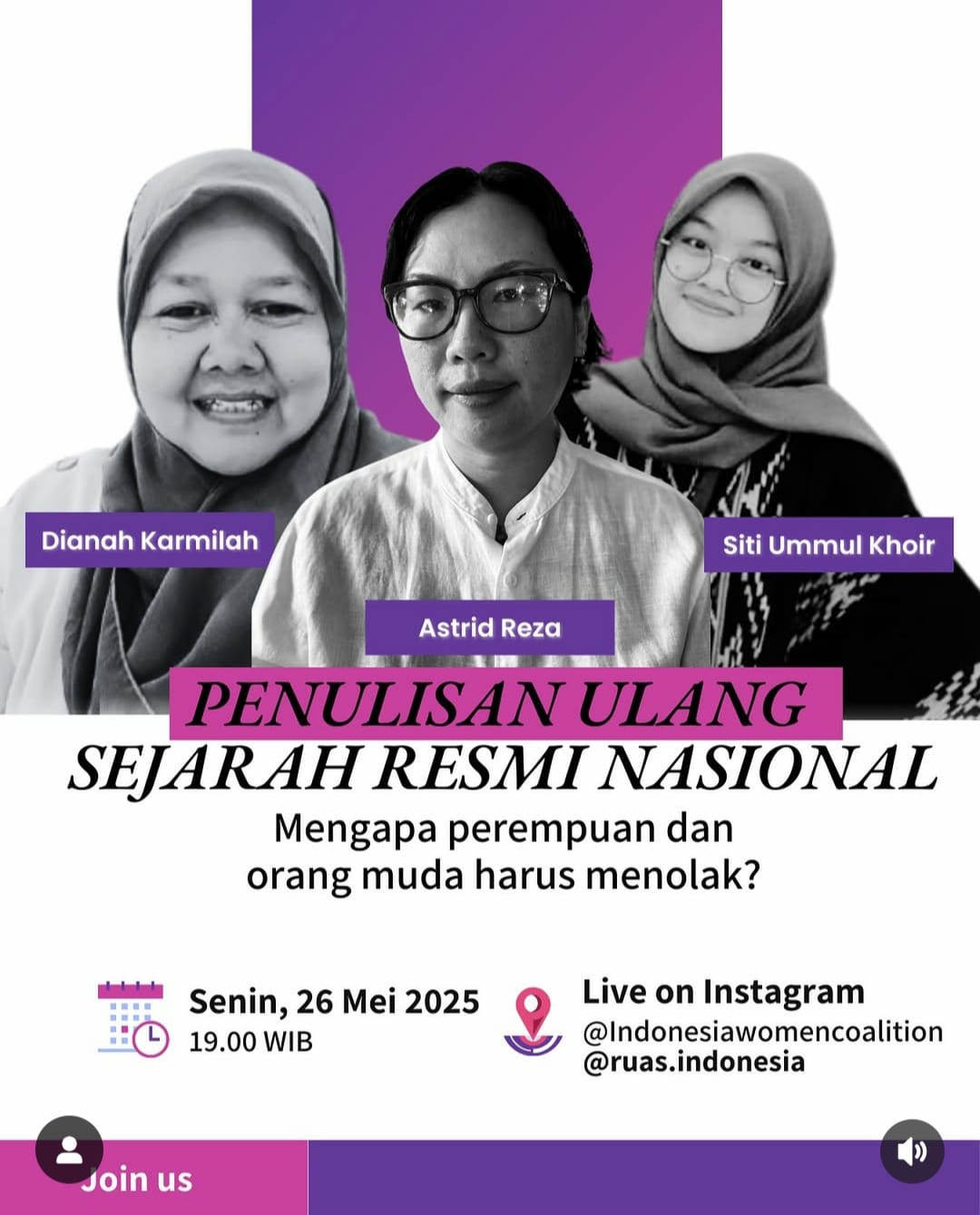The government (Ministry of Culture) is re-writing history. It expects to complete the measure by August 2025. There are, however, significant push-back. Re-writing should be based on the assumption that community history should be nurtured in the community, through research by academics and researchers to ensure incorporation of a variety of viewpoints, and not dependent on one interpretation that could potentially distort history or marginalize women in history. Why do women and young people have to push back against re-writing history? During IG Live moderated by Dianah Karmilah, Indonesia Woman Coalision and Ruas Indonesia invite Astrid Reza.
Astrid Reza, a history professor at Gadjah Mada University and at Cultural Study at Universitas Sanata Dharma, has done a research on women from the year of 1950 to the year of 1965 through memoir analysis. Astrid suggests that push back against openness in history is evident in authoritarian countries adamant to write one official version of history. The word "official" is obviously misleading because it deems other interpretation of history as illegal.
In authoritarian countries, writing history becomes a project. The question then is who is involved in writing such history? Why is there a need to push back on such history. The history-rewriting is an ambitious project, yet the Commission 10 of the Parliament knows nothing about it. There is no public discussion. "Today, I receive revision drafts and make plenty of notes," says Astrid.
Astrid adds that there is no writing of women history in this project, when history writing is very much reliant on women. Today, history lesson is not even better, it is in fact terrible as it contains multiple-problems. There is no women history in the history of revolution. Yet we know that Maria Ulfah, the first Minister of Social Affairs in 1947, was not even featured. Reza suggests that suddenly there is writing about Women Rights Commission in slide 10, and in early draft there is no history about Kartini, and none on women’s congress. History on workers and peasants in 1926-27 is non-existent either. People can access through the media the history of Asiyiyah, the Catholic Women (Wanita Katolik or WK) which are missing in the draft. There is only history of women in PKK (Family Welfare Guidance), Dharma Wanita (Women Organisation for Wives of Government Officials) which sound “official”.
Yet it is critical to know that Gen Z can go to school because of the struggle by past women generation who fought for the country. Debates were essential in the past to discuss whether men and women were able to go to school. Now critical history is banned, women history is banned. Yet, the fact is unambiguous – one cannot see history by closing one eye.
Women fought for women food security and yet this was absent in the draft book. Women played significant roles, yet these roles are suppressed through “PKK domestication.”
It is as if Gen Z needs to be fed, just like during the New Order Regime, which is utterly ridiculous. Women history highlights that Gerwani (Indonesian Women Movement) in 1954 had set up child care.
The IG Live discussion gives rise to idea that, perhaps, the ministry of culture has become a victim of literacy, and one can surmise that this product is only a form of glorification.
Then how can one heal the mental anguish that results from the acts of a brutal State? Today, one can see the process of destruction in women’s movement (Gerwani), which represents a progressive women congress. For 32 years, the New Order Regime treated women and subordinate. History shows that Indonesia was much more progressive in the 1950s – 1965s.
The answer to how to heal the mental anguish is by acknowledging what happened in the past. Acknolwedging that what happened in 1965, the rape tragedy in 1998 where the State never issued any apology. The major concern now is that if future generations are not aware of past history, what would these generation become in 30 years. Why not address past issues. History writing should be inclusive and should belong to everyone. "we have low trust when history only belongs to one person who wears a uniform," says Astrid. (Ast)












